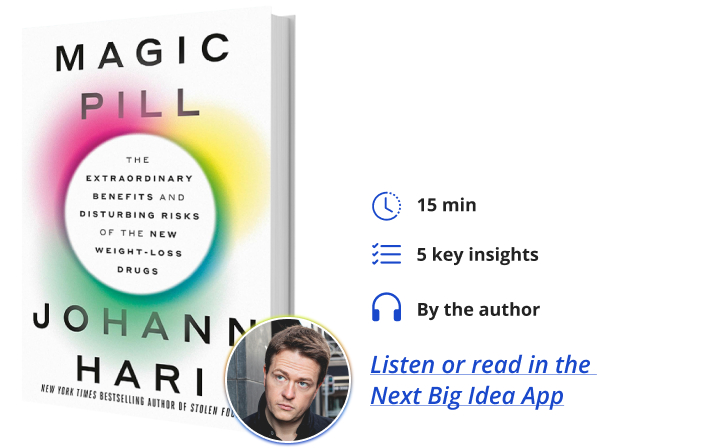Johann Hari is a Scottish writer and journalist who has written for The Independent and The Huffington Post. He is also a New York Times bestselling author and one of the top-rated TED talkers of all time.
Below, Johann shares five key insights from his new book, Magic Pill: The Extraordinary Benefits and Disturbing Risks of the New Weight-Loss Drugs. Listen to the audio version—read by Johann himself—in the Next Big Idea App.

1. There are massive health benefits to these drugs.
Due to the fact that these drugs haven’t existed for that long, the best way to gauge their benefits is actually to look at a parallel area of science. Up until now, it’s been extremely hard to lose huge amounts of weight and keep it off. The best method has been bariatric surgery, a grim, grueling surgery, with a 1 in 1000 chance you could die. However, if you make it through, the health effects of reversing obesity are staggering. In the years that follow, you are 56 percent less likely to die of heart disease, 60 percent less likely to die of cancer, and 92 percent less likely to die of diabetes-related causes. In fact, it’s so good for your health to massively reduce or reverse your obesity that you are 40 percent less likely to die of any cause at all.
The early evidence about how the new weight loss drugs affect people with obesity suggests that they move us in a similar direction. If you take them when you have a BMI higher than 27, your chance of having a heart attack or stroke goes down by 20 percent.
2. You have to weigh these benefits against a lot of risks and unknowns.
While most scientists consider these drugs safe, others are expressing concerns. When rats take these drugs and get pregnant, their babies are more likely to have birth deformities. A team of scientists in France has calculated that the drugs increase your risk of getting thyroid cancer by between 50 to 75 percent (though other scientists disagree). Eating disorder experts are extremely concerned about what happens when their patients get hold of these drugs and amputate their appetites.
Some experts say that we have no idea what the long-term effects of these drugs are. Antipsychotics were thought to be safe until 40 years down the line, when it was discovered that if you take them over the long term, you are significantly more likely to develop dementia. What could these weight-loss drugs do to us?
“Antipsychotics were thought to be safe until 40 years down the line.”
This leaves many of us with a choice. The realistic alternative to these drugs for me was to continue to be obese—and the obesity specialist Dr Shauna Levy, at Tulane University School of Medicine, told me, “We don’t know the long-term side effects [of these new weight-loss drugs] but we do know the long-term side effects of living with obesity.” And they are very serious. We all need to choose our risk, and it’s not an easy calculation to make.
3. These drugs will bring unexpected emotions to the surface.
One day, about seven months after I started taking these drugs, I had a rough day. I was in Las Vegas, investigating the murder of somebody I knew and loved for a book I was working on. It was harrowing. On autopilot, I went to a branch of KFC and ordered what I would have asked for a year before. Sitting there with a bucket of chicken in front of me, feeling immense sadness, I wanted to drown in saturated fats. But I realized I couldn’t eat it. Colonel Sanders was staring at me from the wall, and it felt like he was asking, “What happened to my best customer?” I realized I was just going to have to feel my feelings.
Lots of people use food primarily to manage their emotions. A group of scientists investigating comfort eating heard one patient say, “Food is like a sedative to me. It knocks me out, almost like a drug. When I feel any little bit of sadness or anger, I eat. It’s almost like being fed as a baby. I will eat and eat until I can’t move.” Nearly 31 percent of women and 19 percent of men say they respond to stress by eating in order to feel better. Sitting in that branch of KFC on West Sahara in Vegas, I realized something sobering: only when your eating habits are taken away from you do you understand the job they were doing for you all along.
4. These drugs are for your brain, not your gut.
If you ate something now, after a little while, your pancreas would produce a hormone named GLP-1, which is part of your body’s natural signals, saying, “Stop eating; you’ve had enough.” But natural GLP-1 only stays in your system for a few minutes, and then it’s washed away. So Ozempic and Wegovy (the same drug, marketed under different names) inject you with an artificial copy of GLP-1 that stays around in your system for a whole week.
“Nearly 31 percent of women and 19 percent of men say they respond to stress by eating in order to feel better.”
Initially, scientists thought that because it’s a drug made in your gut, the drug’s effects are mainly on your gut—by, for example, slowing down gastric emptying. However, the picture is shifting because there are GLP-1 receptors in your brain, too, and many scientists believe that these drugs are primarily affecting their users by changing how their brains function.
This is both a more intimate change and a riskier one. Some scientists worry the drugs could trigger depression, but others are optimistic that they may be used to treat addiction. Over the next decade, the discovery of precisely how these drugs affect the brain will be the crucial next step in knowing their benefits and their risks.
5. There are three different ways these drugs could be magic.
There are three different ways in which these drugs could be a magic pill. The first is in the sense that they could be a solution to this problem—one so swift and simple that it seems almost miraculous. There are days, for me, when it feels like this. My whole life, I was obsessed with junk food, and now I have a weekly jab, and the shutters have come down on my appetite.
The second sense is that they could turn out to be an unintended illusion that, when you look closer, is not what it seems. They might not always work exactly as claimed, or they could come with downsides that are not visible at first glance.
In a third sense, they could be magic. Think about the classic stories of magic, like Aladdin. You find the lamp, you make the wish, and it comes true—but never quite in the way you wanted. Or think about the Disney cartoon Fantasia. It’s a parable about how when you start to unleash an unknown force like magic, it can easily spiral out of your control and have effects you could never have imagined at the start.
Emily Field, a sober-minded analyst at Barclays Bank who studied the likely value of these drugs for investors, wrote a report explaining that she believed the impact these drugs would have on society was comparable to the invention of the smartphone. On the day that Steve Jobs unveiled the iPhone in 2007, none of us could have gamed out TikTok, UberEats, and #MeToo. These drugs are going to transform our lives in ways we can only begin to glimpse today. That’s why it’s urgent that we take a beat and think through the evidence very carefully now.
To listen to the audio version read by author Johann Hari, download the Next Big Idea App today:
































